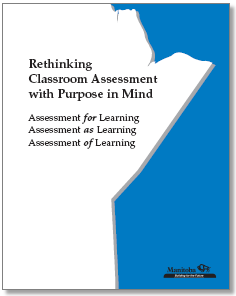 |
| http://georgecouros.ca |
However, the most powerful message I received was his thoughts and experiences with removing grades and awards from his school. George stated this as the difference between performance goals and learning goals. Performance goals are the checkmarks, the conditioning, the "if you sit, I will give you a bone" type of summative assessments; whereas learning goals can encompass the broader, more inquiry-based goals of "I want to speak fluid french".
While the concepts of formative versus summative assessment are not new to us, and have been advocated heavily for by professionals like Brian Cox (Real World Teaching) and MB Education (Rethinking classroom assessment with purpose in mind), they have been theoretical or isolated to a single classroom. George's experiences, however, extend to an entire school where they removed both awards and grades.
After class I tweeted George about this school, as I was unaware that such a school existed within the public system in Canada. He directed me to an archived blog post of his about the subject (here), where he discussed the cons of the traditional system and the advantages of moving towards solely formative assessment.
I'm all for this, but as someone who graduated with grades, received awards and values my GPA - in short someone conditioned to succeed with grades - I question how students, who like me, adapt to a system without rewards? What sort of outcomes do students have within this revolutionary system? As with John Finch's argument for data over intuition, are we able to give a grade to anti-grade systems? After all, as George stated:
"We are measured as a teacher by what they do after, rather than what they do in class".


Deep thoughts, but I like it! I was very intrigued by George's "no awards, no grades" thoughts as well. I tend to agree that awards/rewards are useless in education, but grades, well that's another story. What would summative assessment look like without grades? When assessing student learning, would we use a met/not yet system? Even the learning goal, "I want to speak fluid french" needs to be assessed somehow. What happens if a student doesn't learn to speak fluid french? Do we just shrug our shoulders?
ReplyDeleteAssessment is one topic I could explore for days on end (and I'm sure I will). I had some of the best conversations with my CTs on the topic of assessment. I am currently reading the book "Drive" George recommended, so I hope to gain a little more insight into what he said about getting rid of the reward/grade system schools currently use.
Great questions Lisa! I reached out to Brian Cox about the same questions that I posed to George, and Brian reminded me that while he taught everyday without giving grades, he DID sit down with each student to create a grade come report card time. So, it would appear that a compromise is possible between the two, although I think an outcome based assessment (like we have in this class!) is totally possible.
ReplyDeleteI think your question about learning goals is dependent on wether students are in a curriculum or an inquiry-based system. With a curriculum, it is clear that an outcome (conversing with a native French-speaker) has not been met. However in a inquiry system if a student loses interest or motivation, but has learned during that process, has that student failed?
George linked to a great TED talk by Dan Pink as well: http://bit.ly/Wsoa3E
In MB we are mandated to teach the curriculum and to assess using formative and summative assessment strategies. The new provincial report card requires grade 7-12 teachers to assess using a point/percentage system. It is unavoidable. I'm left wondering how I comply with the mandate, but also do what is best for my students. I feel like I will be told exactly what to do by the powers that be, but if that goes against what I innately know to be the better practice for my students, where does that leave me (and my students).
ReplyDeleteI am the kind of individual who need to know why I should/shouldn't do something. I need to know WHY percentages/points/met/not met/letter grades is the best assessment practice. Show me the research!
I will definitely check out that video by Dan Pink and read the book by Cathy Davidson, that was suggested on the Ed ning.
Thanks Nick, for sharing your thoughts.
I was intrigued by this too, Nick! I was reading a post on Brian Barry's (Nunavut_tweeter) page this morning and he was on the same page as George. He discussed the importance of having intrinsically motivated students vs extrinsic. It would be great if we could all have classrooms full of students who used pure enjoyment to learn and take part in every day school. However like you said, the adjustment will be hard (for students AND teachers) to leave behind the traditional ways of grades and awards. However, if I had to, I would take a stand on learning goals, too, as I feel these are the most important and will direct our students to be motivated and successful. Great post!
ReplyDelete